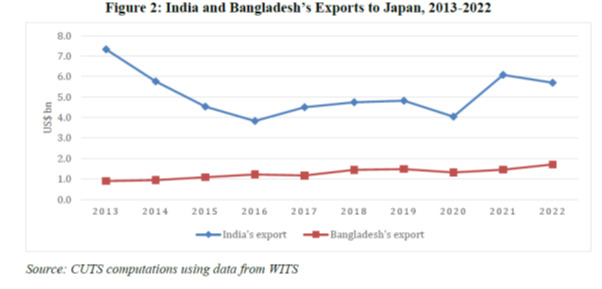NEW DELHI: India needs exploring partnership opportunities to navigate the changing trade dynamics effectively.
Even as Bangladesh and Japan move forward with the signing of an Economic Partnership Agreement (EPA) by December 2025, aiming to strengthen bilateral economic relations and secure duty-free market access for Bangladesh, a report by CUTS International (Consumer Unity & Trust Society) on ‘Preferential Trade Agreements and India’ suggests that India should exercise caution and closely monitor the progress of the Bangladesh-Japan EPA negotiations. As Bangladesh seeks to expand its trade relations with Japan, India should assess the potential impact on its own trade interests and competitiveness in the region, says the report, and suggests India may need to consider strengthening its existing trade ties, diversifying export markets, enhancing competitiveness, and exploring partnership opportunities to navigate the changing trade dynamics effectively.
The CUTS quarterly dossier selectively covers existing and/or potential PTAs between India’s competitors, particularly those that can have significant trade diversion, affecting India’s exports to those countries. India and Bangladesh have discussed preparations to start talks for a free trade agreement between the two countries to promote economic ties.
It was discussed during an official-level meeting of the Joint Working Group on Trade (JWG) between India and Bangladesh, which was held in Dhaka in September 2023.
The meeting “discussed a host of bilateral issues such as removal of port restrictions, groundwork on commencement of Comprehensive Economic Partnership Agreement (CEPA), harmonization of standards, and mutual recognition of standards, supply of essential commodities to Bangladesh. India is the second-largest import source for Bangladesh, trailing only behind China. Dhaka’s exports to India reached a total of USD 1,990 million in 2021–22, whereas imports from India amounted to a USD 13.69 billion in the same period.
A scrutiny of how trade deals between Bangladesh-Japan, Thailand-South Korea, and Indonesia-Sri Lanka are expected to impact India’s exports to those countries, the report observes that India’s market presence in these countries outweighs that of its FTA partners, thus mitigating major concerns. However, in the case of Bangladesh-Japan FTA negotiation talks, India’s exports of some specific products to Bangladesh such as automobiles, metal, electronics, and textiles are of some concern. With Bangladesh-Japan FTA talks progressing, CUTS suggests India should remain vigilant and take precautionary measures to safeguard its own trade interests while fostering regional economic cooperation.
Assessing the impact on India’s exports to Bangladesh, the report points out that Bangladesh is India’s fourth-largest export destination. India’s value of exports to Bangladesh is much larger than that of Japan. Over time the gap between India and Japan’s value of exports to Bangladesh widened as India’s exports grew at very high rates after 2016, except in two COVID-affected years. Japan’s exports also grew but at a very small pace. In 2022, India’s value of exports to Bangladesh was USD 13.83 billion, while that of Japan was only USD 2.55 billion. Among the key export items of India and Japan to Bangladesh, distillation products, and mineral fuels are found to be common. Other key export items of India to Bangladesh include vegetables, cereals, vegetable oil, cotton yarn and fabrics, ferrous products, vehicles, and pebbles.
They collectively constitute 42.75 per cent of its total exports to Bangladesh. In contrast, Japan primarily exports base metals, various other types of vehicles, transport equipment, and machinery.

